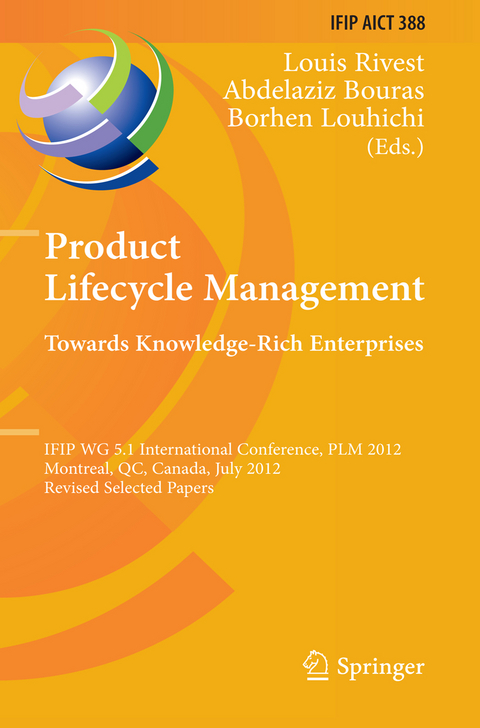Product Lifecycle Management: Towards Knowledge-Rich Enterprises
Springer Berlin (Verlag)
978-3-642-35757-2 (ISBN)
In Collaborative Product Development.- Several Aspects of Information Flows in PLM.- Managing Knowledge Needs during New Product Lifecycle Design on Quick-term Project Development QPD: Case Study of 24 Hours of Innovation - ETS Montreal.- Functional Architecture and Specifications for Tolerancing Data and Knowledge Management.- The Role of Internal and External Sources of Knowledge in the Product Lifecycle in Biotechnology Sector.- Towards the Definition of Domain Concepts and Knowledge through the Application of the User Story Mapping Method.- Mereotopological Description of Product-Process Information and Knowledge for PLM.- The Need for Improved Integration between PLM and KM: A PLM Services Provider Point of View.- ECO-Boat MOL Capturing Data from Real Use of the Product.- Shift from PLM to SLM: A Method to Support Business Requirements Elicitation for Service Innovation.- Life-Cycle Oriented Requirement Formalization and Traceability.- PLM (Product Lifecycle Management) Model for Supply Chain Optimization.- PLM Interoperability with Information Systems.- Manufacturing Process Planning in Set-Based Concurrent Engineering Paradigm.- PLM-Based Service Data Management in Steam Turbine Business.- Verification of Item Usage Rules in Product Configuration.- DMU Maturity Management as an Extension of the Core Product.- Design and Implementation of a PLM System for Sustainable Manufacturing.- Visual and Interactive Tool for Product Development Process Enhancement: Towards Intuitive Support of Co-located Project Review.- Virtually Indistinguishable: Systems Engineering and PLM.- Product Data Reuse in Product Development: A Practitioner's Perspective.- Operational Framework Based on Modeling Languages to Support Product Repository Implementation.- Adapting Product and Development Process for Risk Reduction in New Product Development.- Product Life Cycle Oriented Representation of Uncertainty.- Learning Methodologies to Diffuse Lean Product Development toIndustries.- Set-Based Prototyping with Digital Mock-Up Technologies.- Improved Span Time Performance in NPD Using Better Coordination.- The Role of Product Lifecycle Management Systems in Organizational Innovation.- Creative Tools and Processes to Remain Competitive in the Twenty-First Century.- Towards PLM for Mechatronics System Design Using Concurrent Software Versioning Principles.- Lifecycle Oriented Planning of Mechatronic Products and Corresponding Services.- Design System Assessment Tool.- Software Management in Product Structure.- PLMXQuery: Towards a Standard PLM Querying.- Study on Collaborative Product Development and Digital Engineering Tools.- Can a Product Have a Facebook? A New Perspective on Product Avatars in Product Lifecycle Management.- Management of Associations within Digital Mock-Ups for Improved Collaboration.- A Framework for Evaluating Collaborative Product Representations in Product Lifecycle Workflows.- Future Product Lifecycle Management (PLM) - A Consideration of Informal Communication as a Key Enabler for Future Product Development.- Integration of Explicit Geometric Constraints in the Comparison of 3D CAD Models for Part Design Reuse.- From Functional Analysis to CAD Modelling Based on Knowledge Transformation Driven by the Design Process.- A BREP Model and Mesh Errors Detecting Tool: TopoVisu.- A Modeling Language for 3D Process Plant Layout Representation, Exchange and Visualization.- PLM as Support for Global Design Reuse - Long Term Benefits and Immediate Drawbacks.- PLM Impact Analysis Model - PIA.- A Method to Identify Risks Associated with a PLM Solution.- PLM Reference Model: A Preliminary Proposal for Reference Model Evolution.- Decision Support Framework for PLM Harmonization Projects within Industrial.- Collaborative Design Tools: A Comparison between Free Software and PLM Solutions in Engineering Education.- A Holistic Approach for the Architecture and Design of an Ontology-Based Data Integration Capability inProduct Master Data Management.- Dynamic Customization and Validation of Product Data Models Using Semantic Web Tools.- Toward an Automatic Reduction of Non-added Values Tasks in the Project-Product-Process Domain.- SWRL as a Rule Language for Ontology-Based Models in Power Plant Design.- Visual Product Architecture Modelling for Structuring Data in a PLM System.- Towards Model-Based System Engineering for Simulation-Based Design in Product Data Management Systems.- Defining the Customer Dimension of PLM Maturity.- Maturity Model for Improving Virtual Engineering in Small and Medium-Sized Enterprises.- Approach on Lifecycles on Research Environment and Analysis Based on Systems Engineering (SE).
| Erscheint lt. Verlag | 21.12.2012 |
|---|---|
| Reihe/Serie | IFIP Advances in Information and Communication Technology |
| Zusatzinfo | XVI, 660 p. |
| Verlagsort | Berlin |
| Sprache | englisch |
| Maße | 155 x 235 mm |
| Gewicht | 1172 g |
| Themenwelt | Informatik ► Software Entwicklung ► User Interfaces (HCI) |
| Mathematik / Informatik ► Mathematik ► Finanz- / Wirtschaftsmathematik | |
| Schlagworte | Collaborative Product Development • Innovation • Product Configuration • Product Development • Requirements |
| ISBN-10 | 3-642-35757-1 / 3642357571 |
| ISBN-13 | 978-3-642-35757-2 / 9783642357572 |
| Zustand | Neuware |
| Haben Sie eine Frage zum Produkt? |
aus dem Bereich




